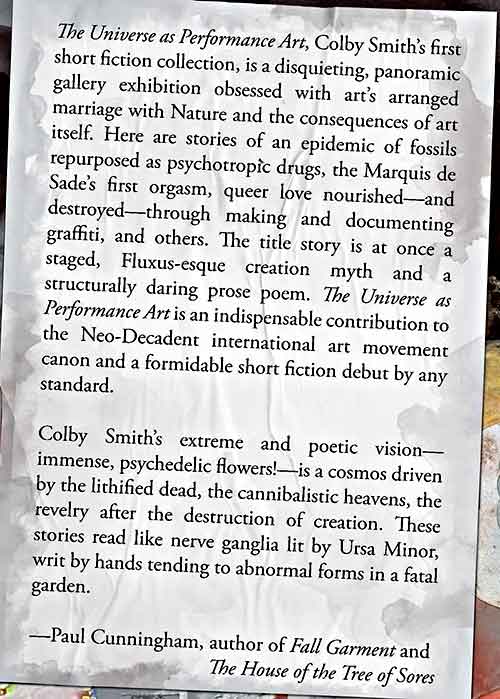By COLBY SMITH (Eibonvale; 2024)
The Neo-Decadent movement gets a strong showing in THE UNIVERSE AS PERFORMANCE ART, the first collection by Colby Smith. That Smith is a poet is evident in these stories, which are profoundly eccentric in both conception and execution, yet also quite rhythmic and concentrated. Appropriately, the title piece is a literal prose poem, with the subject being creation, or “creation-at-once-destruction,” represented by a formless “Her” and an uncanny birth.
The following story is “Pheromone Literature,” a short science fiction-tinged riot of pure invention about a nomadic species of “comparative aestheticians” and their unique biological and artistic properties. More sci-fi shenanigans are found in “The Revelation,” about the “New Black Hell” that envelops a world (ours?) in the wake of the “Great Smog,” and the “New White Dawn” that follows. There’s also “Amaterasu Overthrown,” in which space deities hold council in a non-functioning space station.
“The First Masterpiece of the Marquis de Sade,” one of the more straightforward offerings, concerns a youthful Donatien Alphonse Francois de Sade experiencing his “first masterpiece”—an orgasm—after cutting himself on rose thorns and eating the petals. Another famous personage is featured in the satiric “Baron Munchausen’s Suicide,” with that person being Baron Heironymus Karl Friedrich von Munchausen, who in a convincingly rendered (to anyone who’s read Rudolf Erich Raspe’s STARTLING ADVENTURES OF BARON MUNCHAUSEN) fictional voice describes several outlandish adventures that are slyly contradicted by an unidentified editor’s italicized notes (“There is no record or even rumor of this,” etc.). The poet Ezra Pound is also given an airing, in “Poets Die,” about a troubled nursing home patient going mad(der) upon learning of Pound’s death.
Among the weirdest offerings are “The Game Show Expats,” about the fortunes of three eccentric folk who’ve won a trip to the Florida keys, only to be met with madness, loneliness and severe disillusionment; “Romulus Craved His Mother’s Milk,” involving five workmen with amnesia and an inhuman skull whose discovery has odd effects on the men’s penises(!); “The Bombed Zoo,” told from the point of view of an individual that, we gradually learn, is a zookeeper, working in a time and place that, we gradually learn, will be recognizable to those know their WWII history; “Zhuangzi in Chrysalis,” which provides a mind-boggling Raymond Roussellian extrapolation of Zhuangzi and his butterfly dream; and “Cooking Australia,” whose many interesting revelations include the fact that “Human waste contains grains of memories from the realm of dreams,” and that “There are eighteen human beings in Australia; the rest are paid actors with investments in gold.”
My ultimate takeaway? That weird fiction is alive and well in the twenty first century, and that THE UNIVERSE AS PERFORMANCE ART is a standout example.


